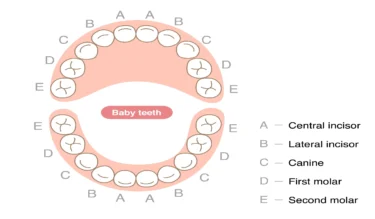When Do Babies Start Teething: A Detailed Development Timeline for New Parents
By Dr. Anmol Batra +2 more

Get,

to manage your symptom
Get your,


4 Cr+ families
benefitted

OTP sent to 9988776655



You’ve successfully subscribed to receive
doctor-approved tips on
Whatsapp

Get ready to feel your best.

Hi There,
Download the PharmEasy App now!!


Register to Avail the Offer
Send OTPBy continuing, you agree with our Privacy Policy and Terms and Conditions

Hi There,
Sign up on PharmEasy now!!
Trusted by 4 crore+ families

OTP sent to 9988776655



You have unlocked 25% off on medicines




Code: NU25
By Dr. Anmol Batra +2 more
Table of Contents
Every baby goes through teething. This process marks their ability to chew on solids and pick up speech. As new parents, if you’re well-informed about teething, this journey becomes easier.
This article will guide you through when babies start teething. We’ll touch upon average teething ages, what affects teething, usual signs, and the sequence of teething. Additionally, we’ll share ways to help your little one feel better during teething. Lastly, we’ll discuss how to look after their new teeth.

A baby will start teething in their first year. Mostly, it’s when they’re around 6 months old1. It can differ from baby to baby. Some babies may start as early as 3 months, others by 12 months of age. Sometimes teeth can be present at birth, known as natal teeth, although these are rare. Family traits or how a baby grows can steer its timeline.
It’s a lesser-known fact that occasionally, babies are born with teeth (natal teeth) or they appear in the first month of life (neonatal teeth). Natal teeth occur in about 1 in every 2000 to 6000 live births. Sometimes, natal teeth can be linked to conditions like cleft lip and palate, Pierre–Robin syndrome, or other syndromes affecting the head and neck area12.
Dr. Rajeev Singh, BAMS
As babies’ new teeth push through, they might feel some unease. How your child copes can change, but knowing these usual signs helps. The signs are as follows2,3:
Did you know?

The timing for new teeth to arrive can change. Yet, they mostly come out in the same order. This information can help you know what’s next with teething. The order in which new teeth appear is as follows1.
By the age of 3, most kids have all 20 baby teeth4.
In my experience, I found that babies with conditions like Chromosomal anomalies may experience late teething. Children without Chromosomal anomalies usually start getting their first teeth between 6 and 12 months. But children with Chromosomal anomalies, they might not have all their baby teeth until they’re 4 or 5 years old, while typically it happens by age 2 or 3. The reasons for this delay are unclear however, it appears that the delayed eruption in children with Chromosomal anomalies is related to their genetic condition10,11.
Dr. Siddharth Gupta, B.A.M.S, M.D
Dealing with a toddler’s distress during teething can be tough. The bright side is that there are several ways to help them, from home remedies to doctor-prescribed drugs.
Natural ways to help ease teething may make your baby feel better. But don’t forget safety while using them.
In rare cases, your baby might need medical options for their teething trouble. Always ask your child’s doctor before giving over-the-counter medicines. You must only use them if home remedies aren’t working.
Here are some easy options:
Prescription medicines and safety precautions.
Also Read: Oral Thrush in Babies: Why It Happens and How to Manage It Safely at Home
While trying to help your child, steer clear of some items. They can pose risks and might not even work.
Therapies to skip are as follows.
Also Read: Colic in Babies: Meaning, Symptoms, Causes, and Effective Treatments
It’s vital to take care of your little one’s mouth before teeth show. If you start early, their new teeth will be strong and healthy.
Here are a few tips that you may try.
Starting early has potential benefits, which are as follows.
Teething is a crucial and normal part of a baby’s growth. Teething can be tough on the baby, but if you know what to expect and know ways that may help, it gets easier. If you’re worried about teething, ask your paediatrician or dentist. They can guide you and offer support based on your baby’s needs.
Also Read: Why Your Baby Isn’t Sleeping and How to Help Them Sleep Through the Night
In conclusion, teething can be a long journey for new parents and their toddlers. Knowing what to expect and when to seek help may make things simpler, and with the right focus, parents may make sure their baby’s dental health is on track. This may ensure good dental health later on in life as well.
First signs can include mood swings, lots of drool, red or sore gums, sleep problems, lack of hunger, and sucking or chewing on their fingers or toys.
Very rarely, babies might show signs as early as 2 or 3 months. Whereas others may not start teething until around 6 months or later.
The discomfort from teething generally lasts a few days. At the same time, teething itself can go on for up to 2 to 3 years until all primary teeth are out.
Teething doesn’t make a baby unwell. But watch for signs like fever, diarrhoea, or long-term fussiness. These signs might mean there’s another health issue that needs a doctor’s attention.
Disclaimer: The information provided here is for educational/awareness purposes only and is not intended to be a substitute for medical treatment by a healthcare professional and should not be relied upon to diagnose or treat any medical condition. The reader should consult a registered medical practitioner to determine the appropriateness of the information and before consuming any medication. PharmEasy does not provide any guarantee or warranty (express or implied) regarding the accuracy, adequacy, completeness, legality, reliability or usefulness of the information; and disclaims any liability arising thereof.
Links and product recommendations in the information provided here are advertisements of third-party products available on the website. PharmEasy does not make any representation on the accuracy or suitability of such products/services. Advertisements do not influence the editorial decisions or content. The information in this blog is subject to change without notice. The authors and administrators reserve the right to modify, add, or remove content without notification. It is your responsibility to review this disclaimer regularly for any changes.
Comments

Leave your comment...
You may also like
Comments